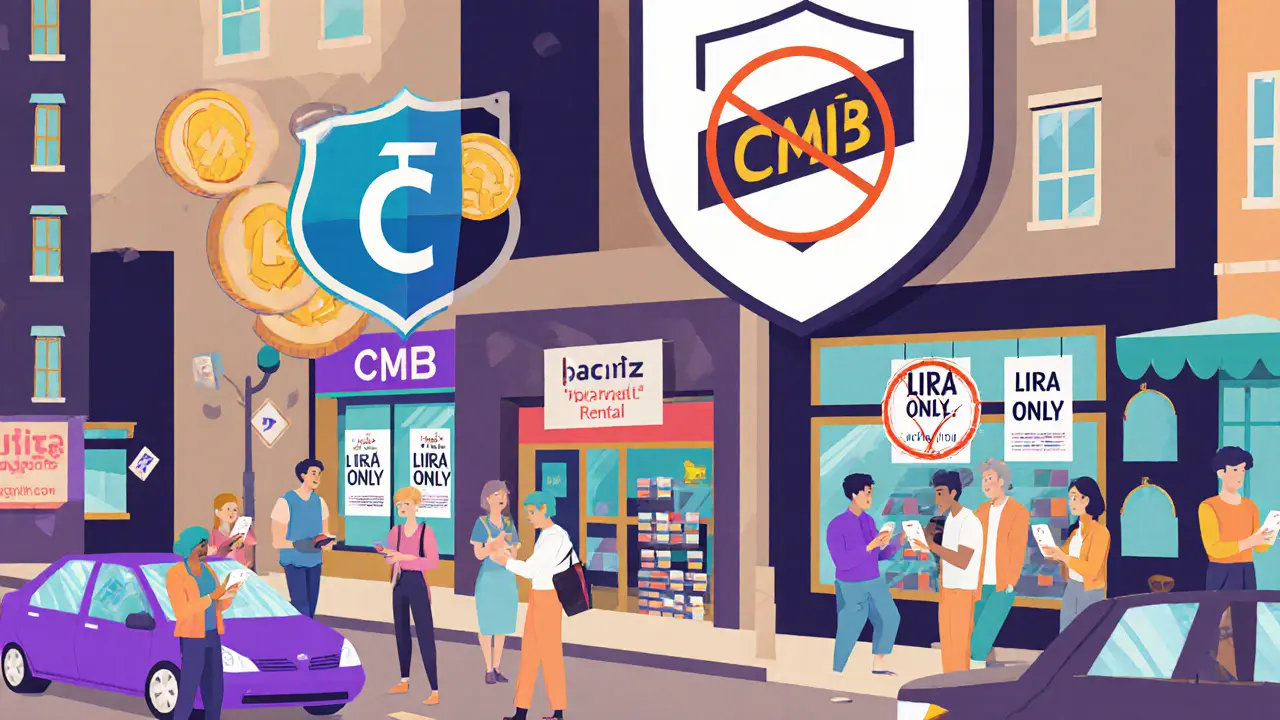Crypto Payment Check
Check Payment Legality
Enter what you want to pay for to see if cryptocurrency payments are allowed in Turkey as of 2025
If you live in Turkey and use cryptocurrency, you’ve probably noticed something strange: you can buy Bitcoin, sell Ethereum, and hold altcoins all you want - but you can’t use them to pay for your groceries, rent an apartment, or buy a car. That’s not a glitch. It’s the law. As of 2025, the Central Bank of Turkey (CBRT) still enforces a strict ban on using cryptocurrencies for payments, even though trading them is completely legal.
Why Can’t You Pay With Crypto in Turkey?
The CBRT’s stance isn’t about banning crypto outright. It’s about protecting the Turkish Lira. Since 2021, the bank has made it clear: only the Turkish Lira is legal tender. That means any business, landlord, or service provider who accepts Bitcoin, Dogecoin, or any other crypto directly for goods or services is breaking the law. This rule applies to everything - from online marketplaces to real estate deals. Even if you and the seller both agree to use crypto, the transaction is invalid under Turkish financial law. This restriction was introduced during a time of high inflation and currency instability. Many Turks turned to crypto not as a speculative investment, but as a way to protect their savings. The CBRT saw this as a threat to monetary control. If people started paying for everything in Bitcoin, the Lira could lose even more relevance. So instead of trying to stop crypto adoption, they decided to control it: let people trade, but don’t let it become money.Who Regulates Crypto in Turkey?
The CBRT doesn’t handle crypto regulation alone. That job falls to the Capital Markets Board (CMB), Turkey’s securities regulator. In March 2025, the CMB released four new communiqués that reshaped the entire crypto landscape. These weren’t just updates - they were a full overhaul. The rules came into effect in phases, with full compliance required by June 30, 2025. Under the new rules, any company offering crypto services - exchanges, wallets, custodians - must get licensed by the CMB. They can’t just set up shop and start taking deposits. They need to be registered as joint-stock companies, with shares issued in cash and held in the names of actual owners. No anonymous shell companies allowed. The capital requirements are steep. Crypto exchanges must have at least 150 million Turkish Lira (about $4.1 million) in capital. Custodians - companies that hold crypto on behalf of users - need 500 million Turkish Lira (around $13.7 million). These aren’t arbitrary numbers. They’re meant to ensure these firms can survive market crashes and cover losses if something goes wrong.What Happens If You Break the Rules?
The CMB isn’t just writing rules - it’s enforcing them. In 2024, Binance TR, the local arm of the world’s biggest exchange, was hit with the maximum fine allowed under Turkish law: 8 million Turkish Lira (roughly $750,000 at the time). Why? Because their anti-money laundering systems failed. They didn’t properly verify users, didn’t track suspicious transactions, and didn’t report high-value transfers. The Financial Crimes Investigation Board (MASAK) - Turkey’s equivalent of the FBI’s financial crimes unit - now has the power to freeze both bank accounts and crypto wallets. They’re also cracking down on rented accounts, where people use someone else’s identity to bypass KYC checks. These are serious measures, and they’re being used. If you’re running a crypto business in Turkey, you’re expected to have a full compliance team. You need identity verification systems that flag transactions over 15,000 Turkish Lira (about $425). You need to keep records of every trade, even canceled ones. You need automated tools to detect unusual patterns - like someone buying $100,000 worth of crypto in 10 minutes and then sending it all to an overseas wallet.
What Can You Actually Do With Crypto in Turkey?
You can buy it. You can sell it. You can hold it. You can even trade it for other crypto assets. You can use it as an investment. That’s all legal. In fact, Turkey has one of the highest crypto adoption rates in the world. According to Chainalysis, Turkish users ranked in the top 5 globally for peer-to-peer crypto trading in 2024. Why? Because inflation has eaten away at the Lira’s value. People aren’t using crypto to pay for coffee - they’re using it to store value. A 2025 survey by a Turkish fintech firm showed that 68% of crypto owners in Turkey bought it to protect savings, not to speculate. The payment ban didn’t stop adoption. It just redirected it. You can also invest in initial coin offerings (ICOs), as long as the platform listing them has CMB approval. But derivatives - like crypto futures or options - are banned. No leveraged trading. No short-selling crypto. The CMB wants to keep things simple and reduce risk for retail investors.What About Foreign Exchanges?
You can still use Binance, Kraken, or Coinbase from Turkey. But if you’re a foreign exchange and you want to actively market to Turkish users, you’re out of luck. The CMB blocks foreign platforms from running ads in Turkish, setting up local offices, or offering Turkish Lira deposits directly. That’s why you see so many Turkish users on foreign exchanges - they’re not breaking the rules, but they’re operating in a gray zone. Banks in Turkey are required to report any foreign exchange conversion over $50,000. So if you’re moving large sums out of your Lira account to buy crypto on a foreign exchange, your bank might flag it. It’s not illegal, but it’s monitored.
Is the Ban Going to Change?
Not anytime soon. As of September 2025, the CBRT has made no indication that it plans to lift the payment ban. In fact, they’re doubling down on their own digital currency: the Digital Lira. This isn’t Bitcoin or Ethereum. It’s a central bank digital currency (CBDC) - a digital version of the Turkish Lira, issued and controlled by the CBRT. The goal? To give people the convenience of digital payments without giving up monetary control. The Digital Lira project is still in testing, but it’s the clearest sign that Turkey’s long-term strategy isn’t to fight crypto - it’s to replace it with something the state can manage. Think of it like this: the CBRT doesn’t want you using Bitcoin to pay for your rent. But they’re fine if you use a digital Lira app to send money to your landlord.What’s Next for Crypto in Turkey?
The real growth area isn’t trading - it’s tokenization. The CMB is already working on rules for turning real-world assets - like real estate, gold, and even art - into digital tokens on blockchain networks. This isn’t crypto speculation. It’s about making traditional investments more liquid and accessible. Imagine owning 1% of a building in Istanbul, not by buying a deed, but by holding a digital token. The value is tied to the property, but you can trade it instantly on a regulated platform. That’s the future Turkey is building - one where blockchain technology is used, but under strict state oversight. For now, the message is clear: crypto is allowed as an asset, not as money. If you want to use it as money, you’ll need to convert it back to Lira first. That’s the rule. And as of 2025, it’s still working - for the bank, for the regulators, and for the millions of Turks who use crypto to protect their wealth.Can I use Bitcoin to pay for rent in Turkey?
No. The Central Bank of Turkey prohibits using cryptocurrencies for any direct payment of goods or services, including rent, utilities, or real estate. Even if both you and your landlord agree, the transaction is not legally recognized. You must convert crypto to Turkish Lira first through a licensed exchange before making any payment.
Is it legal to buy and sell crypto in Turkey?
Yes. Buying, selling, and holding cryptocurrencies is fully legal in Turkey. The ban only applies to using crypto as a payment method. You can trade Bitcoin, Ethereum, and other assets on licensed exchanges like Binance TR or local platforms authorized by the Capital Markets Board.
Do I need to pay taxes on crypto profits in Turkey?
As of 2025, there are no specific crypto tax laws in Turkey. Profits from crypto trading are not officially taxed, but the tax authority (Gelir İdaresi Başkanlığı) has started monitoring large transactions. If you make significant gains, you could be asked to explain the source of funds. Tax rules may change in the near future as the government updates its digital asset framework.
Can I use Binance or Coinbase in Turkey?
Yes, but with limits. You can access international exchanges like Binance and Coinbase, but they’re not allowed to advertise in Turkey, offer Turkish Lira deposits directly, or operate local offices. Many users still use them, but they must deposit funds via bank transfer and handle conversions themselves. Local exchanges like Paribu and BiLira are licensed and regulated, making them safer for most users.
What happens if a Turkish crypto exchange goes bankrupt?
Under the 2025 regulations, licensed crypto exchanges must keep customer assets separate from their own funds. If an exchange fails, your crypto should be protected and returned to you. However, this protection only applies to CMB-licensed platforms. Using unregulated or foreign exchanges means you have no legal recourse if things go wrong.
Is the Digital Lira the same as Bitcoin?
No. The Digital Lira is a central bank digital currency (CBDC) issued by the Central Bank of Turkey. It’s not decentralized like Bitcoin. It’s a digital version of the Turkish Lira, controlled entirely by the state. It will be used for payments, just like physical cash, but in app form. It’s meant to compete with private cryptocurrencies, not replace them.
Can I use crypto to buy property in Turkey?
No. The Central Bank of Turkey explicitly bans cryptocurrency use in real estate transactions. Even if a seller agrees to accept Bitcoin, the deed cannot be transferred unless the full payment is made in Turkish Lira. Some sellers may quote prices in crypto for convenience, but the final payment must be converted to Lira through a licensed exchange before closing.

Louise Watson
November 9, 2025 AT 03:17Crypto isn't money. It's a store of value. The CBRT gets it.
Liam Workman
November 10, 2025 AT 16:44Honestly? This is genius. 🤯 They didn't ban crypto-they redirected it. People still use it to save, but the state keeps control over the actual economy. It’s like letting kids play with LEGO bricks but making sure they don't build a castle in the middle of the highway. Smart. 😊
Benjamin Jackson
November 11, 2025 AT 06:19Love how Turkey’s just quietly building the future without screaming about it. No panic, no crypto hysteria-just steady rules, clear boundaries, and real protection for people trying to survive inflation. Respect. 🙌
Scot Henry
November 12, 2025 AT 22:32So you can buy BTC but not use it to pay your landlord? Wild. But kinda makes sense if you think about it. The lira’s already shaky-letting crypto be money would just make it worse. Not ideal, but pragmatic.
Pranjali Dattatraya Upadhye
November 14, 2025 AT 05:46Okay, but can we talk about how wild it is that Turkey has one of the highest P2P crypto adoption rates in the world... and yet you literally can't buy a kebab with Bitcoin? 🤭 It’s like having a Ferrari but only being allowed to drive it in your garage. So much energy, so little road.
Kyung-Ran Koh
November 15, 2025 AT 15:51This is the most balanced crypto policy I've seen anywhere. Not too strict. Not too loose. They’re not fighting innovation-they’re channeling it. The Digital Lira? Brilliant. It’s like giving people the benefits of blockchain without the chaos. 👏
Missy Simpson
November 16, 2025 AT 16:08Can we just appreciate how the CBRT didn’t panic? Like, everyone else is either banning crypto or trying to copy Bitcoin. Turkey? Nah. They made their own thing. And honestly? It’s working. 💪
Tara R
November 18, 2025 AT 07:02What a farce. People are hoarding crypto because the lira is worthless. The central bank is just pretending they’re in control. This isn’t policy-it’s denial wrapped in compliance forms. The Digital Lira? A digital prison for your savings.
Matthew Gonzalez
November 18, 2025 AT 11:11It’s funny. The whole world’s obsessed with Bitcoin as money. But in Turkey? It’s just a savings tool. No drama. No hype. Just people trying to keep their rent money from turning into toilet paper. Sometimes the most revolutionary thing you can do is stop pretending something’s something it’s not.
Michelle Stockman
November 19, 2025 AT 05:15Oh wow. So you can’t pay rent with crypto... but you can still buy it? That’s like letting someone buy a gun but not let them shoot it. Genius. 🙄
Leo Lanham
November 20, 2025 AT 06:02Turkey’s not banning crypto. They’re just saying: ‘You can own it, but you can’t use it.’ That’s not regulation. That’s emotional blackmail. If the lira was strong, people wouldn’t need crypto. Stop blaming the tool. Fix the system.
Whitney Fleras
November 22, 2025 AT 01:37Really appreciate how this post breaks it down without fear or hype. It’s not about crypto being good or bad-it’s about what the system needs. And honestly? Turkey’s doing what most countries won’t: adapting without collapsing.
Finn McGinty
November 22, 2025 AT 11:37Let me just say this: the Central Bank of Turkey isn’t anti-innovation. They’re anti-chaos. And honestly? If you’ve ever lived through hyperinflation, you’d understand. People aren’t using Bitcoin to buy coffee-they’re using it to keep their kids in school. The ban on payments? It’s not oppression. It’s triage. Let crypto be a life raft, not a currency. The Digital Lira? That’s the bridge. Not the enemy. The future. And if you can’t see that, you’re not looking at the real crisis-you’re looking at your own ideology.
Look, I’m Irish. We’ve seen currency collapses. We’ve seen people trade gold for bread. Crypto isn’t magic. It’s desperation dressed in blockchain. And the CBRT? They’re not trying to stop it. They’re trying to stop people from losing everything. That’s not control. That’s responsibility.
Yes, you can buy Bitcoin. Yes, you can sell it. But you can’t use it to pay your landlord? That’s not tyranny. That’s survival. If the lira dies, the whole economy collapses. And when that happens, no crypto wallet saves you from hunger.
They’re not banning crypto. They’re protecting the social contract. And if you think that’s wrong, ask yourself: what would you do if your paycheck lost half its value in six months? Would you want the government to let people pay rent in Dogecoin? Or would you want someone to hold the line?
The CMB’s capital requirements? Necessary. The fines on Binance TR? Long overdue. The monitoring of foreign exchanges? Smart. This isn’t a dictatorship-it’s a democracy trying to stay alive.
Tokenization of real estate? That’s the real win here. Not speculation. Not gambling. Actual asset ownership made liquid. That’s not crypto. That’s finance. And it’s happening under state supervision. That’s the future. Not Bitcoin. Not Ethereum. But regulated, transparent, accessible ownership.
The Digital Lira isn’t Bitcoin. It’s not even close. It’s the lira-with better UX. And honestly? If I were Turkish, I’d rather use a state-backed digital currency than gamble on a decentralized coin that could crash tomorrow. At least with the Digital Lira, I know who to blame if it fails.
So no, you can’t pay for groceries with Bitcoin. But you can still buy it. And that’s enough. For now. And maybe, just maybe, that’s exactly what the country needs.
Colin Byrne
November 23, 2025 AT 12:52Actually, let’s be real: the entire system is a façade. The CBRT claims they’re protecting the lira, but they’re just trying to maintain their own power. The Digital Lira? It’s not a bridge-it’s a trap. A centralized, surveilled, trackable, government-controlled currency that will eventually replace cash entirely. And you call that progress? This isn’t innovation-it’s authoritarianism with a UI redesign. The fact that people are using crypto as a savings tool proves the lira is broken. Instead of fixing the currency, they’re trying to control the escape hatch. That’s not leadership. That’s fear.
And don’t even get me started on the capital requirements. 150 million Lira? That’s not to protect users-it’s to kill competition. Only big players with deep pockets can survive. That’s how you create a monopoly under the guise of regulation. Binance TR got fined? Sure. But what about the local exchanges? They’re all owned by politically connected elites. The CMB isn’t regulating crypto. It’s consolidating control.
And the ‘tokenization of real estate’? Sounds fancy, right? But it’s just another way to turn property into a financial instrument that only the wealthy can trade. You think a middle-class family in Izmir is going to buy a 1% token of a building in Istanbul? No. They’re still paying rent. And the state is still collecting taxes. The system doesn’t change. It just gets shinier.
Meanwhile, people are still using P2P exchanges because they have no other choice. The banks won’t let them move money. The government won’t let them use crypto. So they use WhatsApp groups and cash drops. And you call that a ‘regulated ecosystem’? It’s a black market with a compliance checklist.
The real story isn’t about crypto. It’s about trust. The Turkish people don’t trust their currency. They don’t trust their banks. And they sure as hell don’t trust their government. So they turn to Bitcoin-not because they love it, but because they have nothing else left. And instead of acknowledging that, the CBRT builds a digital cage and calls it ‘progress.’
That’s not policy. That’s pathology.